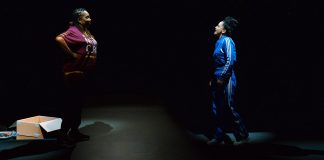Last week, on a ghost train into central London, I was feeling a type of way about committing to review a show that evening. The train had been deserted by its usual passengers in favour of bars, parks and sofas from which they could witness England’s biggest football match in decades. I felt quite the national traitor. But even before I learned the outcome of the game, I knew that the hour I spent watching nine young femmes of colour dominating their own field had been better spent than watching 11 men failing to do so in Russia. Too soon? I don’t invoke our recent trauma to be glib. That evening at the theatre, the sentiments that international tournaments often give rise to were picked apart with heart and bite. Tension with Europe? Check. Undermining non-Western hosts? Check. Racist scapegoating? Check. And at the heart of all this, an exploration of what it really means to be English and to celebrate it.
I have never felt so seen by a stage production as I did while watching Hive City Legacy
In Hive City Legacy [see listing], we meet a recent young emigre to an unnamed city in the UK. They are not given a name so much as an identity that most of us not born of this land can relate to; naïve, curious and hungry. We watch them navigate their integration into UK life, and all the challenges it brings. I was preverbal when I first arrived in the UK, so I do not remember feeling or being accused of being ‘fresh off the boat.’ But I have never felt so seen by a stage production as I did while watching Hive City Legacy. It explores fearlessly and incisively what it means to be young, black or brown, and femme in a country that was made in every way by the bodies and bounties of our homelands but will not claim us as its own (femme is utilised in the show, and borrowed in this review, as an expansive and inclusive term for anyone who identifies as a woman).
The complexity of black femmes’ experiences is made visible throughout; the rage we feel when our bodies are fetishized is acknowledged alongside the joy we take in the curves specific to our phenotypes. Here, the show is poetic but practical, instructional and introspective; it confronts the duality of our lived experiences with singular skill. What Hive City Legacy manages to do better than the millionth think-piece on Lemonade however, is wrest back from hashtag justice warriors and aloof academics, the issues in which we all have a stake. You can tell international creators Lisa Fa’alafi, Busty Beatz and Yami ‘Rowdy’ Lofvenberg did not waste time wringing their hands over whether the show would pass the Bechdel Test. By writing from a place of diligent authenticity, they ensured the experiences of these femmes was centred above all else.
The show does not traffic in pain, it reminds us purposefully that our pain matters but it need not define us
Respectability politics, depression in the black community, transphobia, internalised racism are addressed without speaking down to the audience or losing us in rarefied language. Instead, we are forced to engage in these issues through the visceral routines of nine phenomenal performers. For example, the code-switching black and brown people must undertake to survive in the West is explored in a bipolar musical examination of accents. In fact, Hive City Legacy’s high points are often the low points of black femmes’ lives it lovingly captures. There is a scene in which an incalculable number of racist statements are made, some seemingly innocuous -you know the kind- and others that are unashamedly hateful. I recalled instantly long-forgotten moments when several of them had been made towards me. The effect is intentional, but not manipulative. The show does not traffic in pain, it reminds us purposefully that our pain matters but it need not define us. Better still, we can do something about it. So, when our femmes tell us to believe in their mantra of “activate, pollinate, liberate,” it is completely earned.
This all makes it sound rather dour. It is not. It is quite glorious: bursting with English humour, Island banter, Afrocentric wisdom and American verve. Hive City Legacy does not shy away from the inspirations of the inherent hybridity of immigrants: citing Beyoncé, paraphrasing Chimamanda Ngozi Adichie, and interspersing snippets God Save The Queen with Nicki Minaj. The pop culture references are rapid-fire but employed judiciously. It never feels gimmicky or derivate. Like the best of distinctly black female art, it proudly honours and seeks to preserve the traditions before it, while contributing a new lens through which to analyse our stories. The seamless blending of poetry, dance, spoken word, bravado and song also speaks directly to the oral traditions of black and brown peoples. This is all then cleverly subverted with a conspicuously Western examination. Homage is paid not only in form, but in content, it is equal parts For Colored Girls, Lemonade, A Little Deeper, Purple Hibiscus and Chewing Gum and references each one explicitly and implicitly.
It is not a slick West End production, there are lumps and bumps throughout and they are celebrated. The naturalism, dynamism and youthful sincerity of the show might even trick you into thinking it was all thrown together with a bit of black girl magic. But you need to pay closer attention; the book is as sophisticated as it gets, I caught a dozen more acerbic references on my second viewing. It is not without fault – sometimes the moments that are intended to be really funny are a little cheesy. But the young energy in each of these scenes is what makes the show overall, and so I would not change them.
The show’s greatest strengths lay in its cast. Aminita Francis, Rebecca Solomon, Krystal Dockery, Farrell Cox, Dorcas A. Stevens, Koko Brown, Elsabet Yonas, Shakaiah Perez and Sherika Sherard. I cannot single out a single performer, not because they are necessarily equal in their performances or skill, but because they make a whole I daren’t attempt to divide. Each performer brings with them their distinct personality and style, but effortlessly makes space for the talents of others to shine. There is no competition on stage, each cast member is made stronger metaphorically and literally by their peers. In their diversity, you feel they represent the gamut of black femmes’ experiences in the UK, without ever reducing us to a single story. Everybody should see this show. But if you are young femme of colour drop everything and go now to see yourself reflected in a way that is still all too rare. And in case you missed them the first time, or are at risk of forgetting, their names are Aminita Francis, Rebecca Solomon, Krystal Dockery, Farrell Cox, Dorcas A. Stevens, Koko Brown, Elsabet Yonas, Shakaiah Perez and Sherika Sherard and there is no better use of your time today than an hour in their company, actually winning.


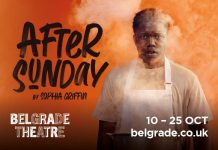
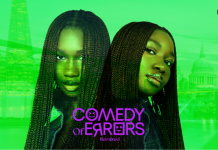
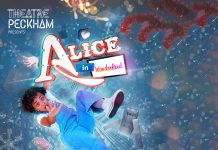
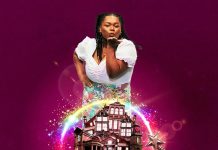


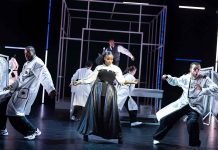






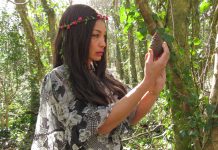
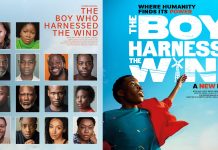

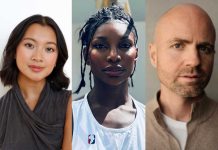



![Hive City Legacy 1 Hive City Legacy, Roundhouse [Photo Helen Murray]](https://www.afridiziak.com//wp-content/uploads/2019/09/Hive-City-Legacy_Production_Roundhouse_Helen-Murray-9.jpeg)
![Hive City Legacy 2 Hive City Legacy, Roundhouse [Photo Helen Murray]](https://www.afridiziak.com//wp-content/uploads/2019/09/Hive-City-Legacy_Production_Roundhouse_Helen-Murray-82.jpeg)
![Hive City Legacy 3 Hive City Legacy, Roundhouse [Photo Helen Murray]](https://www.afridiziak.com//wp-content/uploads/2019/09/Hive-City-Legacy_Production_Roundhouse_Helen-Murray-29.jpg)
![Hive City Legacy 4 Hive City Legacy, Roundhouse [Photo Helen Murray]](https://www.afridiziak.com//wp-content/uploads/2019/09/Hive-City-Legacy_Production_Roundhouse_Helen-Murray-7.jpeg)
![Hive City Legacy 5 Hive City Legacy, Roundhouse [Photo Helen Murray]](https://www.afridiziak.com//wp-content/uploads/2019/09/Hive-City-Legacy-Roundhouse-.jpg)

